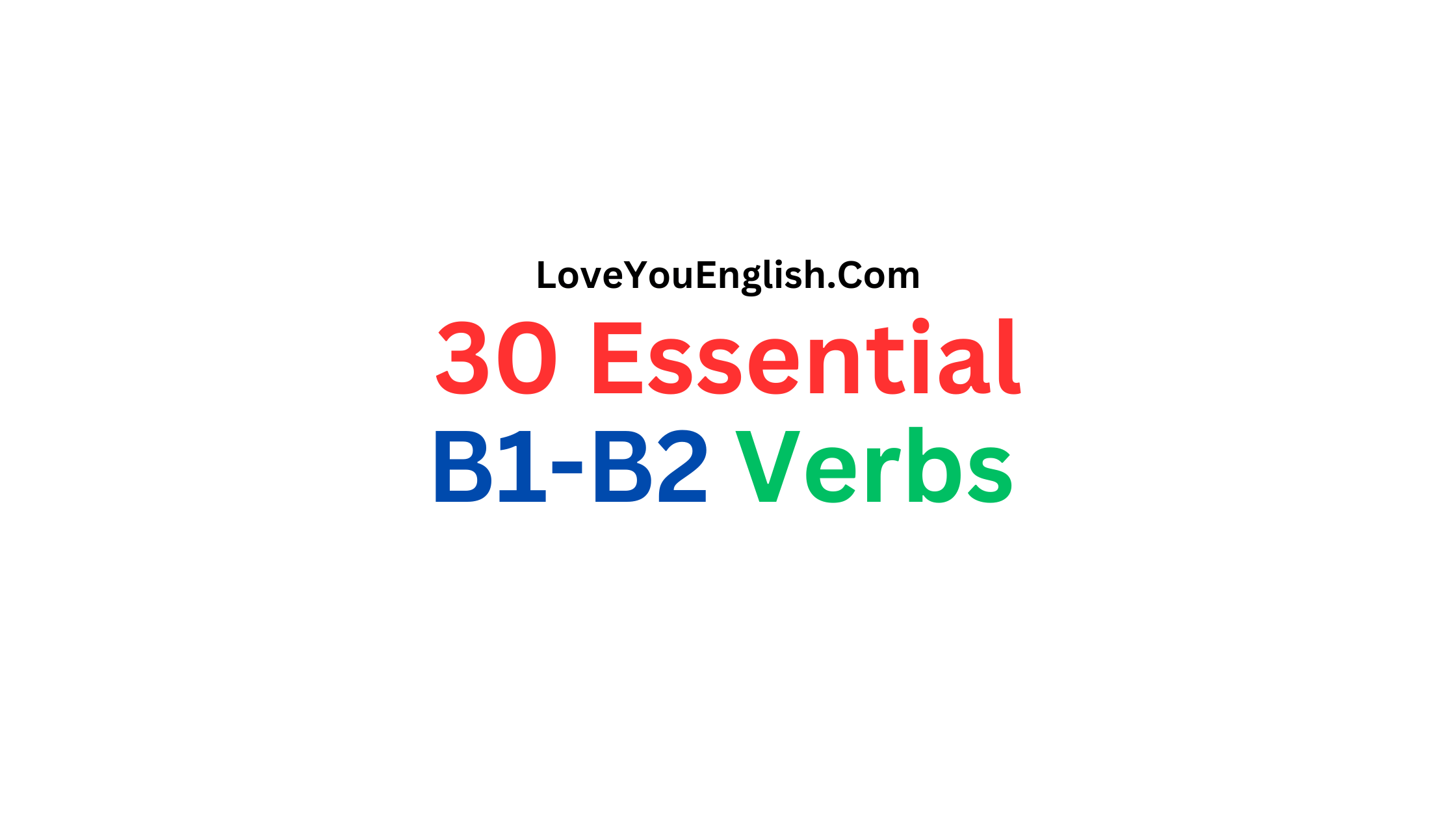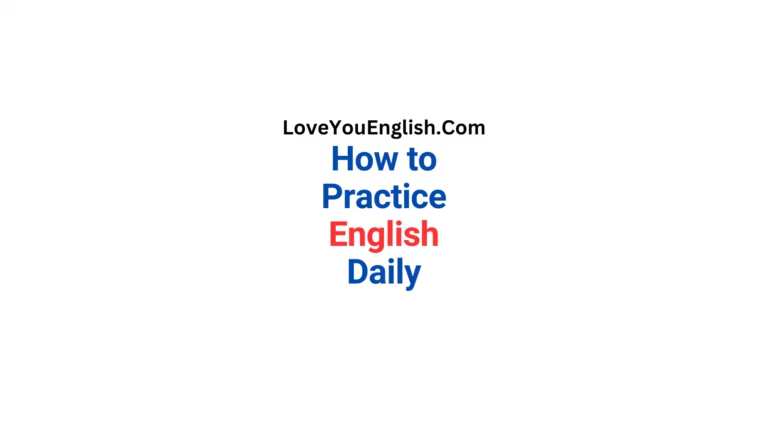30 Essential B1-B2 Verbs for Improving Your English
30 Essential B1-B2 Verbs for Improving Your English is designed for intermediate learners who want to speak and write more naturally. Verbs play a key role in sentence building and communication. This article introduces commonly used B1-B2 level verbs that appear frequently in conversations, exams, and real-life situations. Written in simple and clear English, it is ideal for students preparing for IELTS, school exams, or daily communication. Learning these verbs helps improve fluency, accuracy, and confidence while expressing ideas more effectively in English.
This topic is part of our English Learning for English learners.
1. Achieve
Meaning: To successfully reach a desired goal or result.
Usage: You achieve something when you work hard and accomplish your objectives.
Examples:
- She achieved her dream of becoming a doctor.
- They achieved the project’s goals on time.
2. Announce
Meaning: To make a public statement about something.
Usage: You announce when you want to share important news or information.
Examples:
- The company announced a new product launch.
- He announced his decision to move abroad.
3. Avoid
Meaning: To keep away from something or someone.
Usage: You avoid situations, people, or things you don’t want to deal with.
Examples:
- She avoids eating junk food.
- They avoid going to crowded places.
4. Compare
Meaning: To examine two or more things to see how they are similar or different.
Usage: You compare things to understand their differences and similarities.
Examples:
- Let’s compare these two phones before buying one.
- She compared the prices of different hotels.
5. Confirm
Meaning: To make sure something is true or correct.
Usage: You confirm when you check or verify information.
Examples:
- Can you confirm your appointment for tomorrow?
- He confirmed the details of the meeting.
6. Decide
Meaning: To make a choice after thinking about it.
Usage: You decide when you have to choose between options.
Examples:
- She decided to study abroad.
- They decided which movie to watch.
7. Describe
Meaning: To explain or give details about something.
Usage: You describe when you want to provide information about something.
Examples:
- Can you describe your ideal vacation?
- He described the plot of the movie.
8. Develop
Meaning: To grow or improve something over time.
Usage: You develop when you work on making something better.
Examples:
- They developed new software for the company.
- She is developing her skills in painting.
9. Encourage
Meaning: To give someone confidence or support.
Usage: You encourage others to help them feel more positive or motivated.
Examples:
- She encouraged her friend to try out for the team.
- They encourage students to ask questions in class.
10. Experience
Meaning: To go through something or have an event happen to you.
Usage: You experience events or situations as they happen.
Examples:
- He experienced many challenges during his trip.
- She is looking to gain experience in her field.
11. Explain
Meaning: To make something clear or easy to understand.
Usage: You explain when you need to provide information.
Examples:
- Can you explain the instructions for the game?
- She explained the reason for her decision.
12. Fail
Meaning: To not succeed in achieving a goal or task.
Usage: You fail when you do not meet your objectives.
Examples:
- He failed the driving test but will try again.
- They failed to complete the project on time.
13. Improve
Meaning: To make something better.
Usage: You improve when you want to make progress.
Examples:
- She wants to improve her English skills.
- They worked hard to improve their performance.
14. Influence
Meaning: To have an effect on someone or something.
Usage: You influence others when your actions or words affect them.
Examples:
- Her advice influenced my decision.
- The teacher’s enthusiasm can influence students’ interest.
15. Introduce
Meaning: To present someone or something for the first time.
Usage: You introduce when you meet people or show something new.
Examples:
- I’d like to introduce you to my friend.
- She introduced the new policy at the meeting.
16. Manage
Meaning: To be in charge of or handle something.
Usage: You manage when you are responsible for tasks or people.
Examples:
- She manages a team of ten employees.
- He managed to finish the project early.
17. Mention
Meaning: To briefly talk about something.
Usage: You mention when you want to bring up a topic or detail.
Examples:
- He mentioned that he will be late.
- Did she mention her plans for the summer?
18. Offer
Meaning: To present something for someone to accept or refuse.
Usage: You offer when you give something to someone.
Examples:
- She offered him a cup of coffee.
- They offered to help with the move.
19. Organize
Meaning: To arrange or set up something.
Usage: You organize when you plan or arrange events or items.
Examples:
- They organized a charity event for the community.
- She needs to organize her desk at work.
20. Promise
Meaning: To make a commitment to do something.
Usage: You promise when you assure someone you will do something.
Examples:
- He promised to help with the project.
- She promised to call back later.
21. Provide
Meaning: To give or supply something.
Usage: You provide when you offer resources or assistance.
Examples:
- The company provides health insurance for employees.
- She provided details for the research report.
22. Reduce
Meaning: To make something smaller or less in amount.
Usage: You reduce when you decrease quantity or intensity.
Examples:
- They are trying to reduce waste in their office.
- She reduced her spending to save money.
23. Remember
Meaning: To bring something back to your mind.
Usage: You remember when you think about past events or details.
Examples:
- I remember meeting you at the party.
- Do you remember where you put your keys?
24. Request
Meaning: To ask for something politely.
Usage: You request when you want to obtain or do something.
Examples:
- She requested a day off from work.
- They requested information about the course.
25. Suggest
Meaning: To propose an idea or a plan.
Usage: You suggest when you offer a recommendation or idea.
Examples:
- He suggested trying a new restaurant.
- They suggested changing the meeting time.
26. Teach
Meaning: To help someone learn something.
Usage: You teach when you give knowledge or skills to others.
Examples:
- She teaches English at the local school.
- He taught me how to cook.
27. Travel
Meaning: To go from one place to another.
Usage: You travel when you move to different locations.
Examples:
- They love to travel to different countries.
- She travels to work by train.
28. Understand
Meaning: To grasp the meaning or significance of something.
Usage: You understand when you comprehend information or concepts.
Examples:
- I understand the instructions now.
- Do you understand what I am saying?
29. Visit
Meaning: To go to see someone or a place for a short time.
Usage: You visit when you go somewhere temporarily.
Examples:
- We plan to visit our friends this weekend.
- She visited the museum yesterday.
30. Warn
Meaning: To inform someone of a danger or problem.
Usage: You warn when you want to prevent trouble or danger.
Examples:
- He warned her about the icy roads.
- She warned us not to be late.
Tips for Learning Verbs
Here are some tips to help you learn these verbs effectively:
Make Flashcards: Write the verb on one side and its meaning and examples on the other.
Practice Regularly: Use the verbs in sentences to get comfortable with them.
Read and Listen: Read books, articles, or watch videos in English to see these verbs in context.
Use a Journal: Write about your daily experiences using the new verbs.
Teach Someone Else: Explaining verbs to a friend can help reinforce your knowledge.
Conclusion
Becoming better at English means getting really good at B1-B2 verbs.
If you know these 30 important verbs well, you can talk better in different situations.
Talk with them a lot, practice them often, and you’ll see your English getting better.
Learning a language takes time, and each new verb you learn helps you reach your goals.
Keep trying new things, practicing, and most of all, have fun while you learn!
Good luck with your studies!
You may also like these English learning articles:
- Essay: The Future of Remote Work
- Essay: Should Social Media Be Regulated?
- Essay: The Impact of Cancel Culture
- Essay: Privacy Concerns in the Digital Age
- Essay: Should College Athletes Be Paid?






